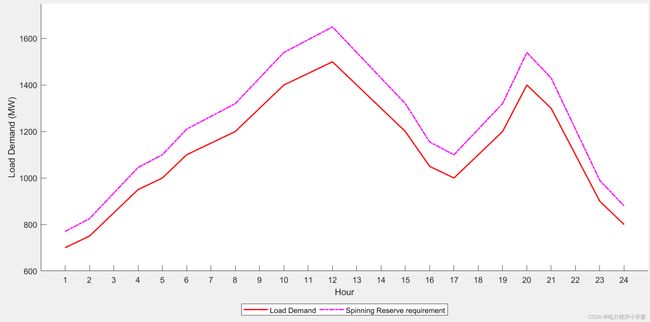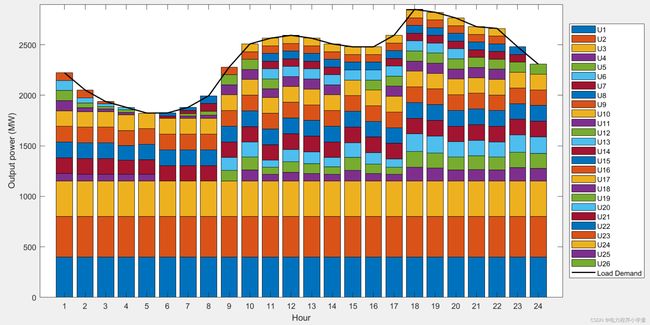基于改进二进制粒子群算法的含需求响应机组组合问题研究(matlab代码)
目录
1 主要内容
2 部分代码
3 程序结果
4 下载链接
1 主要内容
该程序复现《A Modified Binary PSO to solve the Thermal Unit Commitment Problem》第五章内容,主要做的是一个考虑需求响应的机组组合问题,首先构建了机组组合问题的基本模型,在此基础上,进一步考虑负荷侧管理,也就是需求响应,在调控过程中通过补偿引导负荷侧积极进行需求响应,在模型的求解上,采用了一种基于改进二进制粒子群算法的求解方法,相较于传统的粒子群算法,更加创新,而且求解的效果更好,代码出图效果非常好。该程序函数比较多,主函数为Swarm_generator,运行结果已经保存在Graphs文件夹内部,可以通过运行Graphs.m直接得到出图结果。程序采用matlab编程,注释为英文,适合具有编程经验的同学下载学习!
2 部分代码
N=size(I,1); %%%Number of TGU's
T=24; %%%Study period duration
%%%%fmincon.m solver options for F_LIM_ED
OPTS = optimoptions('fmincon','Algorithm','sqp','display','off','ConstraintTolerance',1e-2,'OptimalityTolerance',1.0000e-02,'MaxIterations',100, 'StepTolerance',1e-2,'MaxFunctionEvaluations',100);
%%%%%%%%%%%%%%%%%%%%%%%%%%UNIT DATA%%%%%%%%%%%%%%%%%%%%%%%%%%%%%%%%%%%%%%%%
%%%Generator limits
PGI_MAX=I(:,1); %%%Upper generation limit for each generator
PGI_MIN=I(:,2); %%%Lower generation limit for each generator
%%%I/O curve for each generator is modeled by a smooth quadratic function
%%%i.e C(Pgi)=ai*Pgi^2+bi*Pgi+ci
ai=I(:,3);
bi=I(:,4);
ci=I(:,5);
[I_C_SORT_EXS,IDX_EXS,I_C_SORT_INS,IDX_INS] = AFLC(ai,bi,ci,PGI_MAX); %%%Unit priority list assuming same fuel cost for every unit
%%MINIMUM TIME DATA
MUT=I(:,6); %%%Minimum up-time for each generator
MDT=I(:,7); %%%Minimum down-time for each generator
%%START-UP AND SHUT-DOWN COSTS
SU_H=I(:,8);
SU_C=I(:,9);
CSH=I(:,10);
init_status=I(:,11);
%%%%OTHER CONSTRAINTS
M_R=I(:,13); %%MR units
U_N=I(:,14); %%Unavailable units
%%%% MR & UN hours & units
%%Hr begin Hr end
MR=[ 10 15 ];
UN=[ ];
%%%% Prohibitive operative zones (POZ)
%%%Unit %%%POZ
POZ=[ [1 150 165; 1 448,453]
[2 90 110; 2 240 250]
[8 20 30; 8 40 45]
[10 12 17; 10 35 45]];
%%%%%%%%%%%%%%%%%%%%%%%%%%%%%%%%%%%%%%%%%%%%%%%%%%%%%%%%%%%%%%%%%%%%%%%%%%%
%%%%%%%%%%%%%%%%%%%%%%%%%%%%MAIN LOOP%%%%%%%%%%%%%%%%%%%%%%%%%%%%%%%%%%%%%%
%%%%%%%%%%%%%%%%%%%%%%%%%%%%%%%%%%%%%%%%%%%%%%%%%%%%%%%%%%%%%%%%%%%%%%%%%%%
%%%%%%Initiaize solution (NxT) schedule solution as an empty array
Init_SOL=zeros(N,T);
complete=ones(1,T); %%%Nth unit operation schedule is ON for all t
sum_Pgi_max=sum(PGI_MAX);
%%%%%Define swarm size (Either particle or bee)
SWARM_SZ=20;
PART_BEE=0;
YES_CNT=0;
NO_CNT=0;
population=zeros(SWARM_SZ,N*T);
total_COST=zeros(SWARM_SZ,1);
while PART_BEE0); %%%Find the exception indices for must run units
UN_idx=find(U_N>0); %%%Find the exception indices for unavailable units
%%%%%%%%%%%%Determine initial status of units %%%%%%%%%%%%%%%%%%%%%%%%%%%%%
Tdiff_UP=zeros(N,3);%%%Exception indices for coupling constraints Tdiff_UP
Tdiff_DW=zeros(N,3);%%%Exception indices for coupling constraints Tdiff_DW
for k=1:N
Tdiff_UP(k,1)=k;
Tdiff_DW(k,1)=k;
if ismember(k,MR_idx) || ismember(k,UN_idx) %%%If must run or unavailable unit, continue schedule repair without modifying INIT_SOL
continue
else
P=1+(PGI_MAX(k)/sum_Pgi_max);
if init_status(k)>0 %%Unit Online for ti=init_status hours
Tdiff_U=init_status(k)-MUT(k);
if Tdiff_U<0
Tdiff_UP(k,2)=abs(Tdiff_U);
Tdiff_UP(k,3)=1;
Init_SOL(k,1:Tdiff_UP(k,2))=1;
else
Tdiff_UP(k,2)=0;
Tdiff_UP(k,3)=0;
end
for j=Tdiff_UP(k,2)+1:T
X=-1+(P-(-1))*rand;
if X>=0
Init_SOL(k,j)=1;
else
Init_SOL(k,j)=0;
end
end
else %%Unit is offline for ti=init_status hours
Tdiff_D=MDT(k)+init_status(k);
if Tdiff_D>0
Tdiff_DW(k,2)=abs(Tdiff_D);
Init_SOL(k,1:Tdiff_D)=0;
Tdiff_DW(k,3)=1;
else
Tdiff_DW(k,2)=0;
Tdiff_DW(k,3)=0;
end
for j=Tdiff_DW(k,2)+1:T
X=-1+(P-(-1))*rand;
if X>=0
Init_SOL(k,j)=1;
else
Init_SOL(k,j)=0;
end
end
end
end
end
%%%%%%%%%%%%%%%%%%%%%%%%%%%%%%%%%%%%%%%%%%%%%%%%%%%%%%%%%%%%%%%%%%%%%%%%%%%
%%%%%%%%%%%%%%%%%%Check & Repair Coupling constraints %%%%%%%%%%%%%%%%%%%%%
%%%%%%%%%%%%%%%%%%%%%%%%%%%%%%%%%%%%%%%%%%%%%%%%%%%%%%%%%%%%%%%%%%%%%%%%%%%
%%%%Decompose commitment schedule into T single-hour unit combinations
Exs_On_cap=zeros(3,T); %%Excess online capacity
Ins_On_cap=zeros(3,T); %%Insufficient online capacity
f_unit_ins_all=zeros(N,T); %%%This unit is not part of the exceptions MR,UN,Initialization
free_unit_ins=zeros(N,T); %%%These units are offline and available to be turned off
%%Check Excess online capacity first for full commitment
check_full_exs=ones(1,N)*PGI_MIN; %%%Check if system has excess online capacity for a complete commitment
check_1=find(check_full_exs>P_D);
if isempty(check_1)
clear excp_exs f_unit_exs_all free_unit_exs Exs_On_cap
else
%%%Excess online capacity schedule repair
for t=1:T
u_t=Init_SOL(:,t); %%Decompose into T single hour unit combinations
Exs_On_cap(1,t)=u_t'*PGI_MIN;
Exs_On_cap(2,t)=P_D(t);
if Exs_On_cap(1,t)>P_D(t)
Exs_On_cap(3,t)=1;
format_exs='Excess capacity at hour %u. Repairing schedule...\n';
fprintf(format_ins,t);
end
end
end
status_e=0;
status_f=0;
status_g=0;
status=[status_e,status_f,status_g];
trials=0;
max_trials=15;
while ~all(status)
trials=trials+1;
if trials>max_trials
break
end
if trials==1
%%%Insufficient online capacity initial schedule repair
for t=1:T
u_t=Init_SOL(:,t); %%Decompose into T single hour unit combinations
Ins_On_cap(1,t)=u_t'*PGI_MAX;
Ins_On_cap(2,t)=P_D(t)+SRREQ(t);
if Ins_On_cap(1,t)
3 程序结果
4 下载链接
详见文后联系方式-->程序目录



